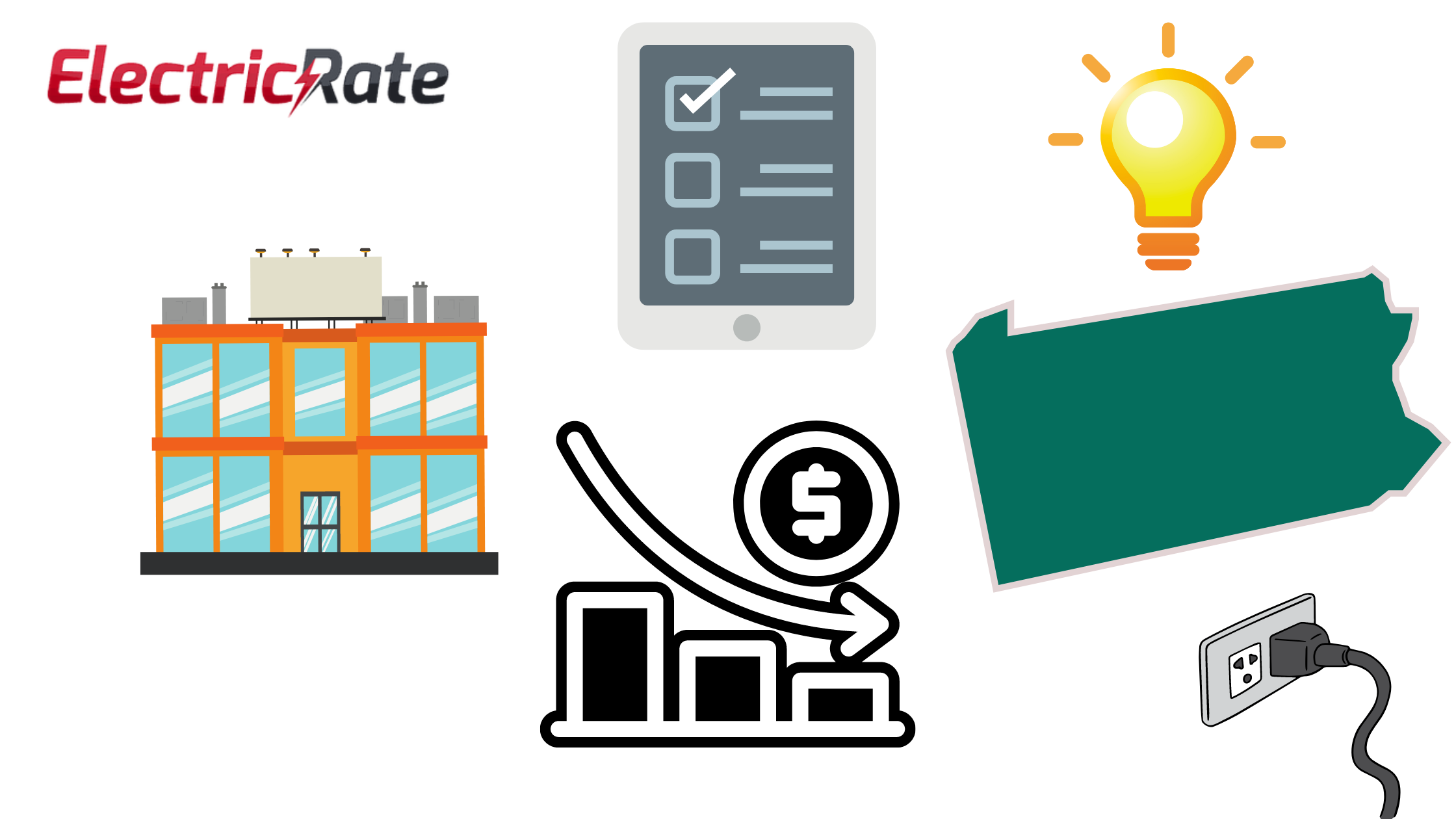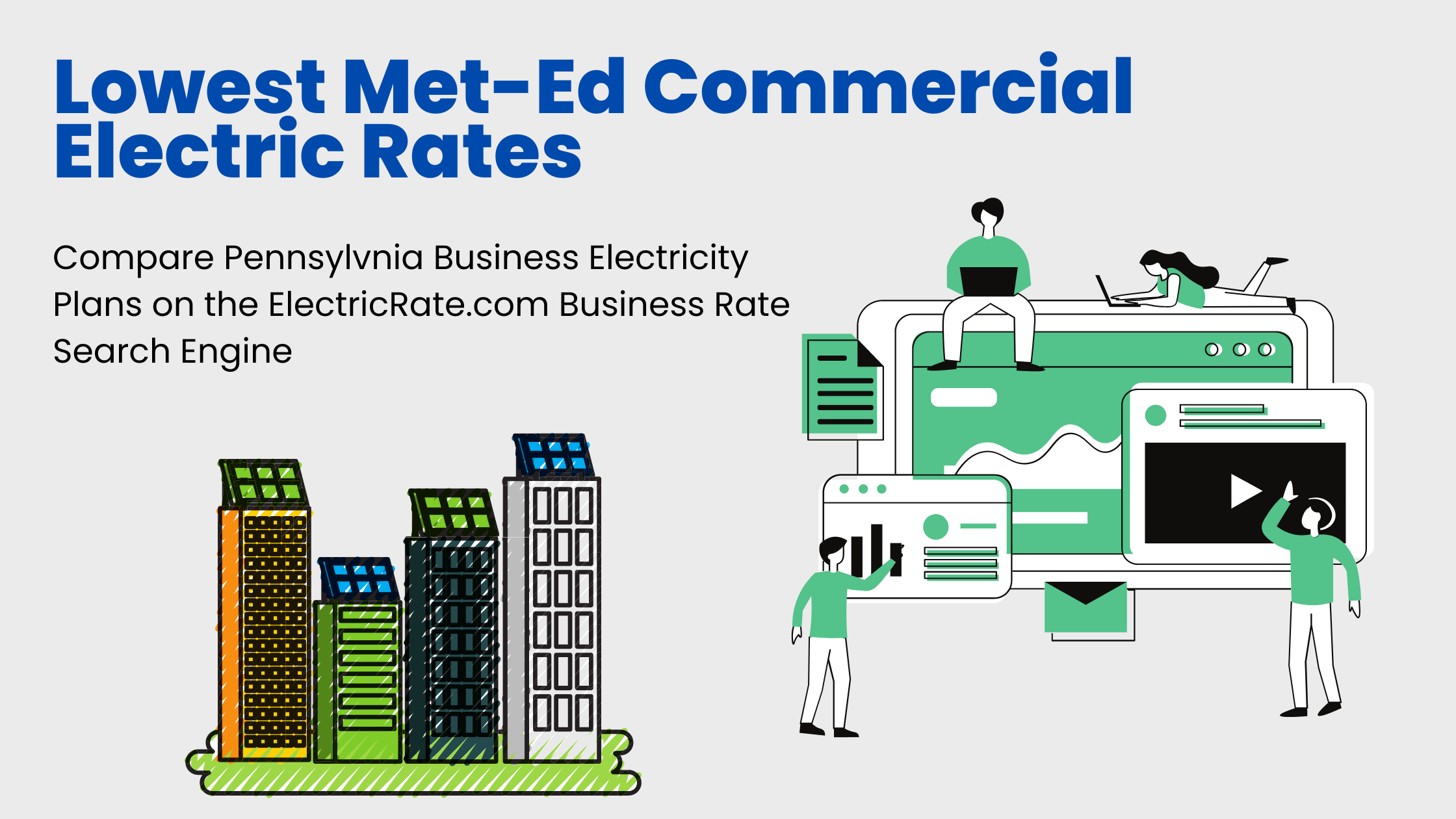
Best Business Electricity Plans in Pennsylvania
Table of Contents
As a small business owner in Pennsylvania, managing your expenses is crucial to your success. One significant area where you can potentially save money is on your electricity bills. With the electricity choice market in Pennsylvania, you have the power to choose the best business electricity plan that suits your specific needs. In this guide, we’ll walk you through the key factors to consider and help you find the best business electricity plan in Pennsylvania.
If your business receives its electric bill from any of the following utilities, then you have the ability to shop for a lower business electricity rate plan:
- PECO
- PPL
- Duquesne Light
- Met-Ed
- Penelec
- West Penn Power
- Penn Power
Understanding Pennsylvania's Electricity Choice Market
Pennsylvania is one of the states that offers businesses the freedom to choose their electricity supplier. This deregulated market allows you to explore various options and select the plan that aligns with your budget and energy requirements. The Pennsylvania commercial electricity market gives businesses a variety of suppliers and rate options to choose from.
Factors to Consider When Choosing a Business Electricity Plan
When it comes to selecting the right business electricity plan in Pennsylvania, there are several crucial factors to keep in mind. Each of these factors plays a significant role in determining the overall cost, stability, and flexibility of your electricity supply. Let’s delve into these considerations to help you make an informed decision.
Energy Usage Analysis
Understanding your business’s energy consumption patterns is the foundation of choosing the most suitable electricity plan. By examining historical usage data from your energy bills, you can identify peak demand periods and overall consumption trends. This analysis empowers you to select a plan that aligns with your energy needs.
For instance, if your business experiences higher energy usage during specific times of the day or certain seasons, a plan that offers time-of-use rates might be advantageous. On the other hand, if your energy consumption is consistent throughout the day, a flat-rate plan could provide predictability in your monthly expenses. Conducting a comprehensive energy usage analysis allows you to match your consumption patterns with a plan that offers the most cost-effective pricing structure.
Fixed vs Variable Rates
Choosing between fixed and variable rates is a decision that impacts both your budget and risk tolerance. Fixed-rate plans lock in a stable electricity rate for the duration of your contract. This can provide peace of mind, as you won’t be affected by market fluctuations. It’s particularly beneficial if you prefer predictable expenses and want to avoid sudden spikes in your bills.
Variable-rate plans, on the other hand, are subject to market changes. While they might offer lower rates during certain periods, they can also increase when market conditions are less favorable. These plans are suitable for businesses that can closely monitor energy market trends and are comfortable with a certain level of risk. Careful consideration of your business’s financial situation and willingness to manage potential rate fluctuations will guide you toward the most suitable rate structure.
Contract Length
Selecting the right contract length is a balance between flexibility and long-term stability. Short-term contracts, typically ranging from a few months to a year, offer the advantage of adaptability. They’re suitable for businesses with uncertain growth trajectories or those that want to explore different plans before committing to a longer contract.
Long-term contracts, often spanning two to three years, come with the benefit of potentially locking in lower rates for an extended period. This can shield your business from market volatility and provide budget predictability. However, long-term contracts might have early termination fees or restrictions that could affect your ability to switch plans.
Carefully evaluate your business’s growth projections and financial stability when deciding on a contract length. If your business anticipates steady growth and wants to secure favorable rates, a longer contract could be a prudent choice. Conversely, if flexibility is a priority, a shorter-term contract allows you to adjust your plan more frequently.
Additional Fees and Terms
When reviewing business electricity plans, it’s essential to examine the terms and conditions beyond the advertised rates. Some plans might include hidden fees, such as enrollment charges, administrative fees, or penalties for early contract termination. Thoroughly reading the contract documents will help you uncover these potential costs and ensure there are no surprises down the line.
In addition to fees, pay attention to any special terms or conditions that could impact your decision. These might include requirements for minimum usage, payment terms, or conditions for renewing or switching plans. By understanding the full scope of the contract, you can make an informed choice that aligns with your business’s financial goals and operational needs.
In conclusion, analyzing your energy usage, understanding rate structures, evaluating contract lengths, and scrutinizing additional terms are critical steps in choosing the best business electricity plan in Pennsylvania. Each of these factors contributes to the overall value and suitability of the plan for your business. By carefully considering these aspects, you’ll be well-equipped to make a decision that optimizes your energy costs and supports your business’s bottom line.
How to Switch to a New Business Electricity Plan
Switching to a new business electricity plan in Pennsylvania is a straightforward process:
Research: Compare plans from different suppliers to find the one that meets your requirements.
Contact Suppliers: Get in touch with the suppliers you’re interested in. Discuss your energy needs and ask for a customized quote.
Review Contract: Carefully review the contract terms, including rates, contract length, and any additional fees.
Sign Agreement: Once you’ve chosen the best plan, sign the agreement with the supplier.
Transition: Your new supplier will coordinate with your utility to ensure a smooth transition without interruption.
The Benefits of Choosing the Right Business Electricity Plan
By selecting the best business electricity plan, you can enjoy several benefits:
Cost Savings: The right plan can lead to significant cost savings on your monthly electricity bills.
Budget Predictability: Fixed-rate plans provide stability and make it easier to budget for energy expenses.
Environmental Responsibility: Opting for renewable energy plans contributes to your business’s eco-friendly initiatives.
Customized Solutions: Some plans offer tailored solutions based on your business’s unique energy needs.
Conclusion
In the competitive Pennsylvania electricity choice market, finding the best business electricity plan requires careful consideration of your energy usage, rate preferences, and contract terms. By analyzing your needs and comparing plans, you can make an informed decision that aligns with your business’s goals and budget. Take advantage of the opportunity to save money while powering your business efficiently and sustainably.





